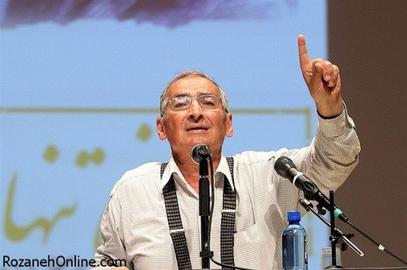Author, political analyst, and professor of political science at the University of Tehran Sadegh Zibakalam has been sentenced to 18 months in prison for propaganda against the Islamic system. The sentence, issued on Tuesday March 13 by Judge Abolghasem Salavati of Branch 15 of the Revolutionary Court, also bans Zibakalam from all political and social activism, as well as any participation in the media, for two years. Zibakalam, who considers himself a reformist, has been an outspoken and active critic of Iran’s conservative principlists for many years and is well known on social media.
IranWire talked to Zibakalam about his prison sentence and how it came about.
Why were you charged with propaganda against the regime?
During the protests [of late December-Early January] I gave an interview to Deutsche Welle and talked about the youth who were demonstrating in various cities and chanting slogans harsher and more radical than those heard in 2009. The reporter asked me what the result would be if a referendum were to be held. "If there were to be a referendum on the political system in Iran now, 70 percent of the people would say no to an Islamic Republic," I said.
What happened at your trial?
I offered a legal and philosophical defense. I asked why somebody who has views different from those of the government is a criminal. I did not refer to any European country but said that in India, Japan, Malaysia, Indonesia or in African countries, having views different from the government is not considered propaganda against the system of that country. But apparently the judge did not find this defense relevant and issued a sentence of 18 months in prison and a two-year ban on political and social activism.
Did you expect such a verdict?
There was one thing that I found interesting. Earlier, if somebody was banned from social and political activities he was ordered not to write articles, not to give interviews and not to participate in the meetings and activities of political and social groups and parties. What I had not heard and what my sentence orders is to be absent from cyberspace for two years. I talk with my students through Telegram, I am active on social networks and do some of my daily chores on the internet. But the verdict says that I must not go online for any purpose whatsoever.
In any case, I am going to appeal the verdict in the next 20 days, and I hope that the appeals court will reduce the sentence.
The investigation and the trial process progressed very fast. Why do you think this was?
I find the haste to hold the trial very strange. Within 10 days the hearings were done, the case was sent to the Revolutionary Court, the trial was held and the verdict was issued. Nowadays they send the summons for the court and the hearings through the internet but in my case I was called and summoned by phone every time.
I tend toward believing that there was an authority behind this case who wanted to punish me. My sentence was based on Article 500 of the Islamic Penal Code, which lays down a prison sentence of three months to one year for anybody who engages in any type of propaganda against the Islamic Republic of Iran. But I was sentenced to 18 months. The verdict says that since I have a record of propaganda against the regime, I was given an extra six months in prison. Of course it is true. I had been found guilty of the charge before and had to pay a cash fine of four million tomans [around $1,100].
Two weeks ago you were expelled from Azad University. Do you think these two events are related?
It is unlikely. Our system is not so organized and tidy that it can connect everything together. However, it is possible that the punishments are connected.
Will you remain silent for two years if the appeals court does not change the sentence?
I have to obey the verdict no matter what. After the 2009 [presidential] election, they told me not to give interviews to the BBC, Radio Farda and Voice of America. And I have not given any interviews to these three media outlets for eight years now. This time they could have also told me not to give interviews or not do things online, but instead they put it in a court verdict. I believe that even if the appeals court changes the 18-month prison sentence to a cash fine, the ban on political and social activities will remain intact.
Why?
I guess — and I emphasize that this is just a guess and I hope I am mistaken — that possibly after the earthquake in Kermanshah [in November 2017] and the people’s support for me, some authorities might not have liked people’s trust in me. [According to the website the Conversation, Zibakalam raised more than US$300,000 less than 48 hours after the quake. “Acknowledging a widespread lack of faith in government, he traveled to the area to supervise aid distribution himself,” wrote the author of the article, Haidar Khezri.]
More from Sadegh Zibakalam:
Sadegh Zibakalam: I Will Not Trample on the American Flag, November 2016
Rouhani Has no Power to Free Karroubi, August 2017
What would a nuclear deal mean for Iran?, March 2015
visit the accountability section
In this section of Iran Wire, you can contact the officials and launch your campaign for various problems

























comments